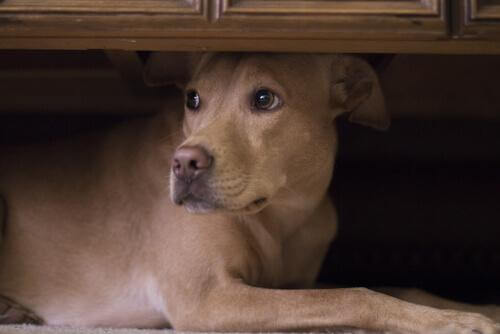Noise Phobia: Tips to Help Your Dog

Does your dog hide under the table every time they hear thunder? Or do they tremble every time they hear fireworks? That may mean they are afflicted by noise phobia. Today we’ll give you some tips to deal with a dog that’s afraid of loud sounds.
Animals have a much more developed sense of hearing than we do. It’s for this reason that many dogs have a noise phobia, even when it comes to sounds that aren’t too loud for us.
In other cases, dogs can get extremely frightened when they hear very loud noises such as firecrackers, car horns and the vacuum cleaner.
The main symptoms of noise phobia are stress and anxiety and they can produce trembling, strange behavior, panting and even running away.
In addition, they may also urinate or defecate in forbidden or unusual places. They can also bark, howl, or just remain still in a particular place. Usually a place where they can bury their heads. For example, under the bed, a table, a sofa, a chair, etc.

Why is my dog noise phobic?
It isn’t necessary for an animal to have to suffer because of particular noises. However, there are cases of dogs that connect the sounds they’re afraid of with bad experiences from their past (this mainly happens to street dogs). Noise phobia may develop for any of the following four reasons:
1. Unfamiliar sounds
If the dog’s never heard a particular noise before, then it’s normal for them to panic and/or hide.
2. Trauma
If the animal experienced something unpleasant in the past and connects it to a specific sound, then it’s likely that their stress levels will increase every time they hear it.
3. Sensitization
Some dogs become more sensitive to certain sounds over time. Perhaps because they’re weaker in their old age, and also when they’re sick.
4. Social transmission
Did you know that a person can transmit fears to their pets? For example, if you’re afraid of thunder, then it’s likely that your dog will be too. Don’t forget that a dog’s personality is matched to his owner’s, and they mimic a lot of the things their owner does.
In addition, there are certain dog breeds that are more prone to suffer from noise phobia. Among them are the German Shepherd, Shetland Shepherd, Border Collie, Welsh Corgi, Australian Shepherd, and Old English Shepherd.
Dogs with noise phobia

You must bear in mind that when a dog is afraid of a sound it’s because they consider it dangerous. Therefore, our first recommendation is that you remain calm in order not to transmit your fear or insecurity to the animal.
Many people make the mistake of trying to comfort the dog. However, this is the wrong signal for him. Why? Because this relates to positive reinforcement (prizes and rewards). By doing this, you’ll make him think that urinating inside or barking are allowed.
If a storm is approaching, and you already know that your dog will be scared, then the best thing you can do is encourage them to take refuge in a quiet place away from the noise. The bathroom may be ideal for this purpose.
Noise phobia: let them be
Let your dog find their own sanctuary and let them be there until the storm or fireworks are over. Don’t try to force them to come into your bed –unless they calm down and want to follow you there.
Instead, leave them enough water, their blanket, or some toys, in order to make them feel at ease. Try not to return repeatedly, as this would only increase their stress and make them nervous.
Some people play relaxing music to try to shut out the sounds that produce noise phobia in their dogs. Others wrap strips of cloth on the dog’s bellies so they feel protected. And there are even those who opt for homeopathic treatments to try to relax their pets.
Dogs with noise phobia can’t always help the way they react because fear is instinctive. Because of this, you must learn how to help them through such episodes to the best of your abilities.
Does your dog hide under the table every time they hear thunder? Or do they tremble every time they hear fireworks? That may mean they are afflicted by noise phobia. Today we’ll give you some tips to deal with a dog that’s afraid of loud sounds.
Animals have a much more developed sense of hearing than we do. It’s for this reason that many dogs have a noise phobia, even when it comes to sounds that aren’t too loud for us.
In other cases, dogs can get extremely frightened when they hear very loud noises such as firecrackers, car horns and the vacuum cleaner.
The main symptoms of noise phobia are stress and anxiety and they can produce trembling, strange behavior, panting and even running away.
In addition, they may also urinate or defecate in forbidden or unusual places. They can also bark, howl, or just remain still in a particular place. Usually a place where they can bury their heads. For example, under the bed, a table, a sofa, a chair, etc.

Why is my dog noise phobic?
It isn’t necessary for an animal to have to suffer because of particular noises. However, there are cases of dogs that connect the sounds they’re afraid of with bad experiences from their past (this mainly happens to street dogs). Noise phobia may develop for any of the following four reasons:
1. Unfamiliar sounds
If the dog’s never heard a particular noise before, then it’s normal for them to panic and/or hide.
2. Trauma
If the animal experienced something unpleasant in the past and connects it to a specific sound, then it’s likely that their stress levels will increase every time they hear it.
3. Sensitization
Some dogs become more sensitive to certain sounds over time. Perhaps because they’re weaker in their old age, and also when they’re sick.
4. Social transmission
Did you know that a person can transmit fears to their pets? For example, if you’re afraid of thunder, then it’s likely that your dog will be too. Don’t forget that a dog’s personality is matched to his owner’s, and they mimic a lot of the things their owner does.
In addition, there are certain dog breeds that are more prone to suffer from noise phobia. Among them are the German Shepherd, Shetland Shepherd, Border Collie, Welsh Corgi, Australian Shepherd, and Old English Shepherd.
Dogs with noise phobia

You must bear in mind that when a dog is afraid of a sound it’s because they consider it dangerous. Therefore, our first recommendation is that you remain calm in order not to transmit your fear or insecurity to the animal.
Many people make the mistake of trying to comfort the dog. However, this is the wrong signal for him. Why? Because this relates to positive reinforcement (prizes and rewards). By doing this, you’ll make him think that urinating inside or barking are allowed.
If a storm is approaching, and you already know that your dog will be scared, then the best thing you can do is encourage them to take refuge in a quiet place away from the noise. The bathroom may be ideal for this purpose.
Noise phobia: let them be
Let your dog find their own sanctuary and let them be there until the storm or fireworks are over. Don’t try to force them to come into your bed –unless they calm down and want to follow you there.
Instead, leave them enough water, their blanket, or some toys, in order to make them feel at ease. Try not to return repeatedly, as this would only increase their stress and make them nervous.
Some people play relaxing music to try to shut out the sounds that produce noise phobia in their dogs. Others wrap strips of cloth on the dog’s bellies so they feel protected. And there are even those who opt for homeopathic treatments to try to relax their pets.
Dogs with noise phobia can’t always help the way they react because fear is instinctive. Because of this, you must learn how to help them through such episodes to the best of your abilities.
All cited sources were thoroughly reviewed by our team to ensure their quality, reliability, currency, and validity. The bibliography of this article was considered reliable and of academic or scientific accuracy.
- Ib��ez Taleg�n, M., Anzola Delgado, B., & Valverde del Valle, C. (2010). Fobia a ruidos en un perro. Canis et Felis.
This text is provided for informational purposes only and does not replace consultation with a professional. If in doubt, consult your specialist.








